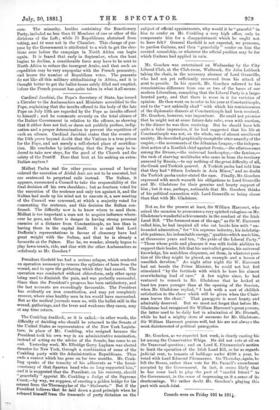The Conkling deadlock, as it is called,—in other words, the
difficulty of deciding who should be returned to the Senate of the United States as representative of the New York Legisla- ture, in place of Mr. Conkling, who resigned because the President took his own way in an administrative nomination, instead of acting on the advice of the Senate, has come to an end. Yesterday week, Mr. Elbridge Gerry Lapham was elected Senator for New York, through a combination of some of the Conkling party with the Administration Republicans. Thus • ends a contest which has gone on for two months. Mr. Conk- ling speaks of the tenacity of his adherents as "the heroic constancy of that Spartan band who so long supported him," and it is suggested that the President, on his recovery, should " gracefully " appoint Mr. Conkling a Judge of the Supreme Court,—by way, we suppose, of erecting a golden bridge for his retreat from the Thermopylae of the "Stalwarts." But if the President believes that he laid down a good principle when he released himself from the trammels of party dictation on the
subject of official appointments, why would it be " graceful " in him to confer on Mr. Conkling a very high office, only to compensate him for a disappointment which he ought not to have felt ? General Garfield is not expected, we presume, to pardon Guiteau, and then " gracefully " confer on him the coveted consulship, or whatever the official position may be for which Guiteau had applied in vain.


































 Previous page
Previous page